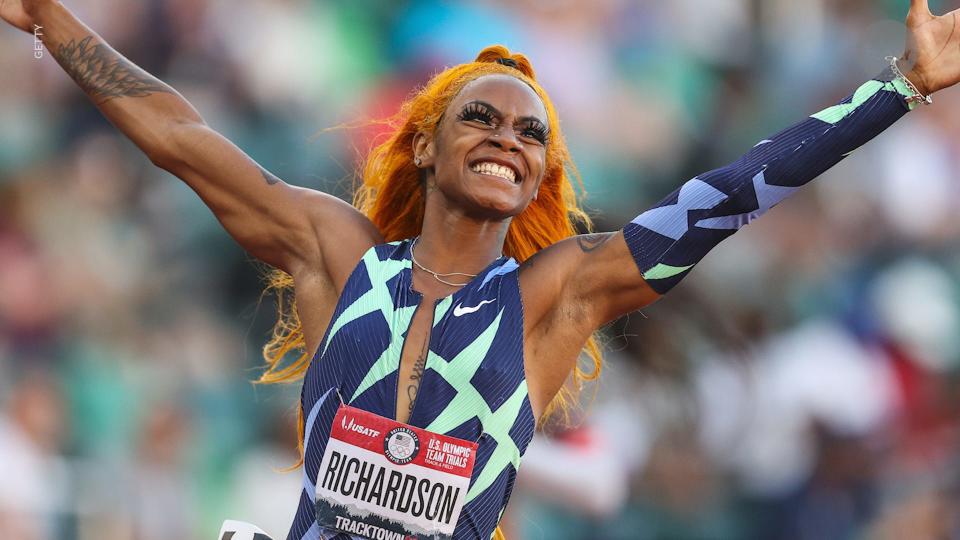I'm an addiction doctor. Let Sha'Carri Richardson compete – and stop testing athletes for cannabis
On Friday, a star American sprinter, Sha’Carri Richardson, was barred from competing in her signature Olympic event, the women's 100-meter dash. Her infraction? Testing positive for tetrahydrocannabinol, the psychoactive compound in cannabis. Although Richardson’s drug test was obtained in Oregon, where Olympic trials were held and where recreational cannabis use among adults is legal, World Anti-Doping Agency rules dictated that she be suspended from competition for at least one month.
Sha’Carri Richardson and other athletes who use cannabis should be allowed to compete. Professional athletes should not undergo cannabis testing in the first place. The U.S. Olympic Committee should exercise its considerable influence and have cannabis removed from the World Anti-Doping Agency’s list of prohibited substances.
Many of us list of prohibited substances – including me, an addiction doctor – found ourselves scratching our heads at the World Anti-Doping Agency’s seemingly antiquated rules on cannabis. The Agency classifies substances as “prohibited” if they meet two of three criteria – that the substance is performance-enhancing, is a health risk to the athlete, or violates the ‘spirit of sport.' I assert that cannabis does not meet this definition.
USA TODAY Opinion newsletter: Get the day's best insights in your inbox.
Cannabis doesn't help performance
Unlike the other prohibited substances like anabolic steroids and stimulants, cannabis is not performance-enhancing. In fact, cannabis use can cause deficits in coordination in the short-term that arguably could worsen performance.
On the other hand, heavy cannabis use in young people is associated with risk for mental health problems such as psychosis. Given that many athletes are teens or young adults like Richardson, the second of the Agency’s criteria – that a substance is a health risk to the athlete – is likely satisfied.
'Living case study': Why I entered the medical marijuana industry after retiring from the NFL
It seems unlikely, however, that cannabis use violates the spirit of sport, which the World Anti-Doping Agency defines as “the ethical pursuit of human excellence through the dedicated perfection of each athlete’s natural talents.” Use of a substance that causes little to no harm when used recreationally, infrequently, and safely in an adult’s private life does not, in my opinion, satisfy this criterion. At a minimum, we can argue that cannabis no more meets the Agency’s criteria than another substance that is conspicuously not prohibited: alcohol.

There are other arguments against barring athletes who use cannabis. Urine drug testing is a tricky science. Tests can be fraught with false positives — instances in which an individual tests positive but never used the substance, which could happen if, for example, an athlete eats a hemp-containing food product. Tests can also result in false negatives, which occur when an athlete used a substance but the test missed it.
Cannabis is also slow to clear from the body. Unlike many other ‘water-soluble’ substances such as stimulants that are eliminated from the body in one to three days, tetrahydrocannbinol is a fat-soluble substance that is eliminated more slowly and typically takes a week to clear from the urine. In individuals who use cannabis more frequently, full elimination can take up a month. In other words, an athlete testing positive for cannabis may not have used for weeks.
Because of these complications, urine drug testing should only ever be conducted by a trained expert. Presumably Richardson’s drug test was interpreted by professionals. However, many amateur athletes banned from sports for cannabis use are denied this opportunity, with interpretation falling to coaches, school officials, and local sports organizations.
Changing views on cannabis use
I strongly doubt that Richardson has a cannabis use disorder. But imagine another athlete who does. Cannabis use disorder, a condition in which someone has persistent, compulsive cannabis use despite negative life consequences, is a medical diagnosis that affected nearly 5 million Americans in 2019.
Addiction doc here. NO ONE should be banned from sports for use of cannabis. #ShacarriRichardson should be allowed to compete. 🇺🇸 My thoughts below… pic.twitter.com/gsmlgK45s8
— Scott Hadland, MD (@DrScottHadland) July 2, 2021
Suspending an athlete with a cannabis use disorder from competing runs contrary to what we should do when someone struggles with substances. Suspensions amount to punishment, which is commonly ineffective in the management of addiction. The correct approach is to engage someone in cannabis use disorder treatment and, if safe, allow an athlete to continue competing. This approach is not only compassionate but also likely to support the athlete’s mental health and accelerate their recovery.
Cannabis reform? It's the right time for full federal legalization
Some might argue that cannabis prohibitions in sports could serve an important public health role by deterring young athletes from using drugs. Data to back this assertion, however, are lacking. Many of the young athletes I work with as a doctor stop using cannabis when they anticipate being tested, and instead use at other times. In other words, drug tests change when – not if – they use substances. Conversely, I have watched many youth be harmed by being removed from activities they love because they used cannabis.
National sentiment is changing on cannabis. The substance is legal for recreational use in 19 states and nearly two-thirds of Americans support these policies. It is time that international, national, state, and local athletic oversight agencies stop punishing athletes for using a substance that when used infrequently results in little harm, offers no competitive advantage, and should not be tested for in the first place.
Let Sha’Carri Richardson compete.
Dr. Scott Hadland is the incoming head of adolescent medicine at MassGeneral Hospital for Children and Harvard Medical School.
This article originally appeared on USA TODAY: Olympics: Let Sha'Carri Richardson run. Stop drug tests for cannabis

